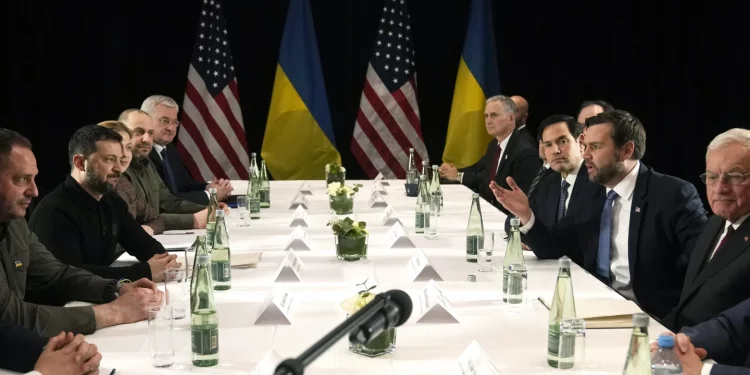Afissure seems to have appeared in the decades-old alliance between Europe and the United States. This drifting apart is visible if developments of the past week are any indication. During the three-day Munich Security Conference, which wrapped up on 16 February, US Vice President JD Vance delivered a harsh ideological critique of Europe. He accused its leaders of stifling free speech, neglecting to address illegal migration, and shying away from the genuine concerns of their constituents. In the aftermath, European leaders have been grappling with a more stringent stance from Washington on matters such as democracy and Ukraine’s future, as the Trump administration disrupts long-standing transatlantic norms established since World War II.
In a scathing address on 14 February, Vance openly challenged the justification for US defence of contemporary European values, depicting a landscape of European politics marred by media censorship, cancelled elections, and political correctness. He contended that the real danger to Europe did not arise from external forces like Russia or China, but rather from the continent’s own withdrawal from its “most fundamental values.” Throughout his speech, he consistently questioned whether the US and Europe still shared a common agenda. “If you are afraid of the voices, the opinions and the conscience that guide your very own people … If you’re running in fear of your own voters, there is nothing America can do for you, nor for that matter is there anything you can do for the American people,” Vance said.
Not only that, Vance held a meeting with Alice Weidel, the leader of Germany’s Far-Right Alternative für Deutschland (AfD) party, in Munich. This meeting breaks a longstanding taboo in German politics, especially as the new administration in Washington seeks to engage with and support Far-Right populist parties throughout Europe. The timing of Vance’s meeting with Weidel is particularly noteworthy, occurring just weeks before a German election where the anti-immigrant, anti-Moslem party is expected to secure a strong second-place finish amid rising anti-establishment sentiment.
US President Donald Trump’s efforts for a swift resolution to the Ukraine conflict have raised concerns and uncertainty across Europe. Leaders of European countries were already aware of the potential challenges posed by a second Trump presidency and the strain it could place on transatlantic relations. However, the recent phone call between Trump and Russian President Vladimir Putin sent shockwaves through the European Union (EU) and in the capitals of nations who are members of the North Atlantic Treaty Organization (NATO). Following their conversation, Trump announced that he and Putin would likely meet soon to discuss a peace agreement for Ukraine, and he later reassured Ukrainian President Volodymyr Zelenskyy that he would also be included in the discussions. Nevertheless, US officials have indicated that European nations would not participate in the peace process. This has sparked growing anxiety among Europeans about being completely excluded from the talks regarding Ukraine and possibly from the broader restructuring of the new international order.
Unsettled over the policy shift from Washington, French President Emmanuel Macron has called for an emergency meeting with European leaders, including UK Prime Minister Keir Starmer, amid rising concerns about Trump’s efforts to dominate the Ukraine peace process. The meeting, anticipated to take place on 17 February, is expected to address the US attempts to sideline European leaders in the negotiations, Europe’s stance on Ukraine’s potential NATO membership, and the provision of security guarantees for Ukraine, whether through NATO or a separate European armed force, as suggested by Zelenskyy.
Also Read: Third US military aircraft with 112 deportees arrives in Amritsar
The swiftness with which European leaders, including Starmer despite the UK having left the EU, are uniting shows the urgency of the matter and also the scare that has been put into the very hearts of those leaders. There are lessons that India too should learn from these moves by Trump. Undoubtedly, Europe, much more than Asia, is far more valuable for the US when matters of security and military preparedness are taken into account. It could probably be since most white Americans can trace their ancestry to different parts of Europe. Lesson in this is that a country like India better learn to stand up for itself and get ready for all eventualities.







































